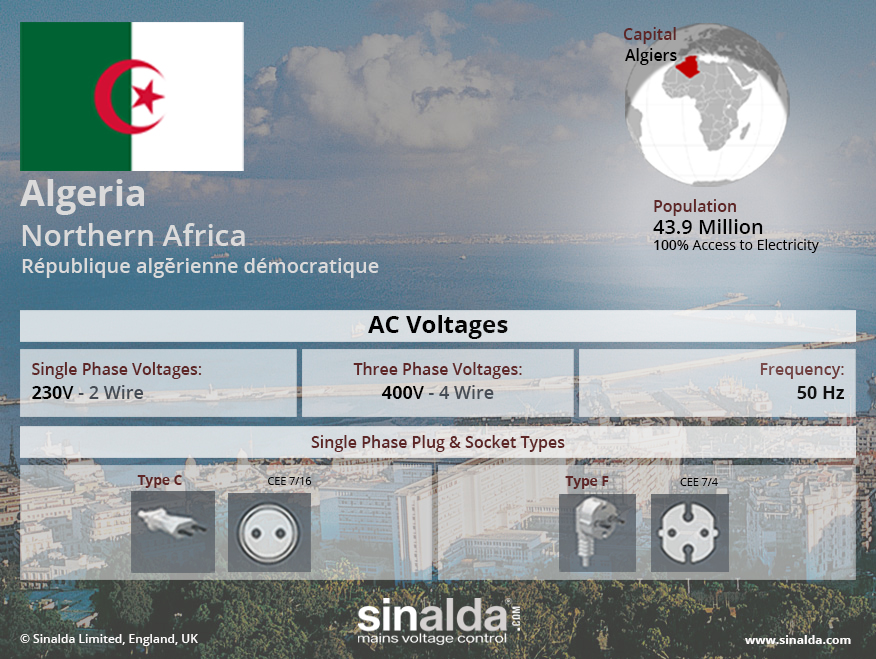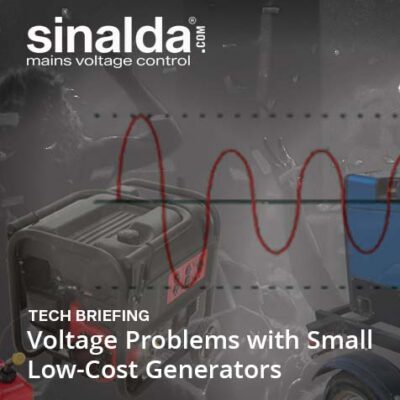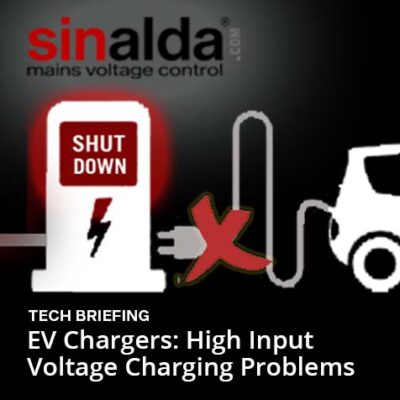Last Updated: 01 November 2021

Copyright 2021 Sinalda. Permission to use this image is granted subject to appropriate credit being given to www.sinalda.com as the source.
Power Quality in Algeria
With growing economic prosperity and population numbers, Algeria struggles at times to ensure the quality of its utility mains supply, especially during summer peak demand times, which can result in occasional power outages and brownouts.
Power Quality in Algeria
Algeria is a North African country with a Mediterranean coastline and a Saharan desert interior. Post-independence, the country’s economy has been dominated by the state.
Today in 2017 with a population of around 41 million and over 50 percent of the nation’s territory being classified as inhospitable, most of the inhabitants live in the coastal northern part of the country. The World Bank estimates that the nation’s population is today four times larger than it was in 1960 with nearly three quarters of its people now living in urban areas. This rise in population numbers has led to a significant growth in the demand for power.
With the ever-rising demand for power, it is estimated that the country enjoys near to 100% access to electricity (compared to 57% in 1977). From the years 2010 to 2013, Algeria’s energy consumption rose by 22%, and continues to rise currently at around 5-6% per annum. Demand in the hot summer months, due to extensive need for air conditioning, can result in unscheduled power outages and brownouts.
Sonelgaz (a government owned company), created in 1963, oversees the generation of the nation’s electricity. In addition, they are also responsible for running and maintaining an aging and inefficient transmission network which is linked to the networks in Tunisia and Morocco.
The latest figures available would indicate that Algeria’s electricity generation capacity reached 15.2 gigawatts (GW) at the end of 2014, up from 12.9 GW at the end of 2012 and 11.4 GW at the end of 2011. Power demand peaked during the summer months and reached a new peak of 12.4 GW in August 2015, leaving very little head room in ensuring the availability of sufficient power.
With the country having some of the largest deposits of oil and natural gas across the globe, power generation is primarily based on natural gas (50.4%) and oil (49.5%). Moving forward, with the country having some of the highest solar radiation levels in the world, an abundance of sunshine, low precipitation, and hundreds square kilometres of underserved solar-exposed land in the Southern region, by 2025-2030 the government wishes to change the energy mix so that at least 15% is derived from renewable resources (primarily solar).
Whilst the quest for renewables is commendable, as recently highlighted by the report by BMI Research, the additional capacity that this will add to the network is unlikely to be sufficient to accommodate the anticipated growing demands of the economy. The long-term agreement with General Electric in April 2017 to service and upgrade Sonelgaz’s 10 power plants, which currently generates 11 gigawatts of power, should result in greater generation efficiency and should be able to deliver more than 420 megawatts of additional power, so it is unlikely that the gap between supply and demand will materially improve.
Most commentators agree that additional investment in capacity and the modernisation of the network infrastructure will still be necessary if deterioration of the nation’s power quality is to be avoided. This need for investment comes at a time where the slump in global oil prices since mid-2014 has put pressure on Algerian Government’s revenues. Thereby, resulting in the slowing down of much need privatisation of state-owned industries, cut backs on investment in infrastructure projects, restrictions on imports and limits being imposed on foreign involvement in the economy.
Realistically looking forward, it is unlikely that in the short to medium term the power quality situation in Algeria will improve, with the utility supply still being subject to brownouts and the occasional outage – especially in the summer months when peak demand can be expected.
Share your Views and Experiences
Every reasonable effort is made to ensure that the information provided above is accurate. No guarantees for the accuracy of the information is made.
So we are able to keep the content updated, and actual on the ground experiences can be shared with others, please feel free to contact us.







